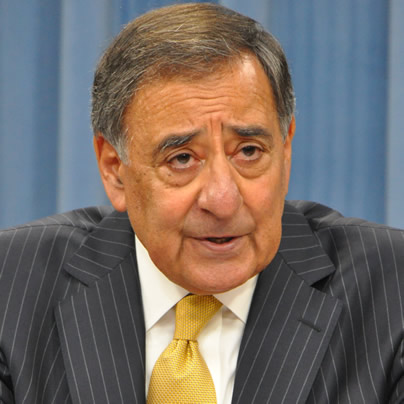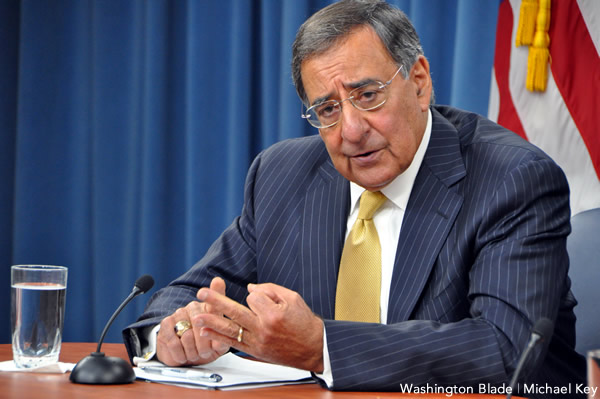National
Pentagon to extend partner benefits to gay troops
Panetta expected to announce changes this week


Defense Secretary Leon Panetta is expected to extend limited partner benefits to gay troops this week. (Blade photo by Michael Key)
The Pentagon is set this week to announce that it will extend long-sought partner benefits to gay and lesbian service members, according to a report in The Washington Post confirmed as accurate by an LGBT advocate familiar with the process.
The Defense Department has reportedly decided to extend these benefits amid media scrutiny and calls from LGBT advocates to make the change before outgoing Defense Secretary Leon Panetta leaves his post.
It’s not immediately clear which benefits that LGBT advocates have been calling for will be extended to gay troops with same-sex partners or when this week the decision will be formally announced. A White House spokesperson deferred comment to the Defense Department, which didn’t immediately respond to a request for comment.
LGBT advocates, including the LGBT military group OutServe-SLDN, have been calling on Panetta to issue via secretarial directive certain partner benefits they say could be extended administratively at any time. Among them are military IDs, joint duty assignments, housing, access to the commissary and availability of family programs and legal services.
Other benefits, such as health and pension benefits, cannot be extended at this time to gay troops because of the Defense of Marriage Act and U.S. law governing rights for service members.
Since the time that “Don’t Ask, Don’t Tell” was lifted in September 2011, Pentagon officials have said they’ve been reviewing the issue to determine which benefits can be extended under current law. However, no action has been taken.
LGBT advocates responded to the news by urging the Pentagon to provide partner benefits to the fullest extent under the law.
Allyson Robinson, executive director of OutServe-SLDN, said Panetta has a “strong civil rights record” during his tenure at the Pentagon and his reluctance to extend these benefits for so long has “baffled many” seeking the benefits.
“We are hopeful that he will not take half-measures here; for him to grant anything less than the full extent of benefits available under current law would be an anticlimactic end to an otherwise exemplary record on civil rights,” Robinson said.
Chad Griffin, president of the Human Rights Campaign, expressed a similar sentiment that the Pentagon should go as far as possible in extending benefits to gay troops.
“We welcome the news that benefits will be extended to the same-sex spouses and partners of gay and lesbian service members, and urge Secretary Panetta to make sure every benefit possible under the law is included,” Griffin said. “This is the logical next step in ensuring all our military families are treated with the dignity and respect they deserve.”
The issue has also received attention on Capitol Hill. Sens. Kirsten Gillibrand (D-N.Y.) and Jeanne Shaheen (D-N.H.), members of the Senate Armed Services Committee, sent a letter to the Pentagon last week calling on Panetta to extend these benefits. A group of 25 House members led by Rep. Adam Schiff (D-Calif.) also signed a letter sent last week calling for enactment of the benefits.
In a statement, Schiff said he’s “encouraged to hear” the Pentagon will finally take action.
“We need to make sure that all military families – including those with same-sex partners serving at home or abroad – have access to the very best care, facilities and services possible,” Schiff said. “In his last days before leaving office, Secretary Panetta can add to his already long list of accomplishments, take up this cause and make sure that the administration acts.”
The issue has received more attention in the wake of a controversy over a spousal club at an Army base in Ft. Bragg, N.C., refusing to offer membership to Ashley Broadway, the spouse of a lesbian service member. At one point, Broadway was informed she was ineligible for membership because she lacked a military ID. The spousal club has since offered Broadway full membership.
U.S. Supreme Court
Supreme Court to consider bans on trans athletes in school sports
27 states have passed laws limiting participation in athletics programs

The U.S. Supreme Court on Thursday agreed to hear two cases involving transgender youth challenging bans prohibiting them from participating in school sports.
In Little v. Hecox, plaintiffs represented by the ACLU, Legal Voice, and the law firm Cooley are challenging Idaho’s 2020 ban, which requires sex testing to adjudicate questions of an athlete’s eligibility.
The 9th U.S. Circuit Court of Appeals described the process in a 2023 decision halting the policy’s enforcement pending an outcome in the litigation. The “sex dispute verification process, whereby any individual can ‘dispute’ the sex of any female student athlete in the state of Idaho,” the court wrote, would “require her to undergo intrusive medical procedures to verify her sex, including gynecological exams.”
In West Virginia v. B.P.J., Lambda Legal, the ACLU, the ACLU of West Virginia, and Cooley are representing a trans middle school student challenging the Mountain State’s 2021 ban on trans athletes.
The plaintiff was participating in cross country when the law was passed, taking puberty blockers that would have significantly reduced the chances that she could have a physiological advantage over cisgender peers.
“Like any other educational program, school athletic programs should be accessible for everyone regardless of their sex or transgender status,” said Joshua Block, senior counsel for the ACLU’s LGBTQ and HIV Project. “Trans kids play sports for the same reasons their peers do — to learn perseverance, dedication, teamwork, and to simply have fun with their friends,” Block said.
He added, “Categorically excluding kids from school sports just because they are transgender will only make our schools less safe and more hurtful places for all youth. We believe the lower courts were right to block these discriminatory laws, and we will continue to defend the freedom of all kids to play.”
“Our client just wants to play sports with her friends and peers,” said Lambda Legal Senior Counsel Tara Borelli. “Everyone understands the value of participating in team athletics, for fitness, leadership, socialization, and myriad other benefits.”
Borelli continued, “The U.S. Court of Appeals for the Fourth Circuit last April issued a thoughtful and thorough ruling allowing B.P.J. to continue participating in track events. That well-reasoned decision should stand the test of time, and we stand ready to defend it.”
Shortly after taking control of both legislative chambers, Republican members of Congress tried — unsuccessfully — to pass a national ban like those now enforced in 27 states since 2020.
Federal Government
UPenn erases Lia Thomas’s records as part of settlement with White House
University agreed to ban trans women from women’s sports teams

In a settlement with the Trump-Vance administration announced on Tuesday, the University of Pennsylvania will ban transgender athletes from competing and erase swimming records set by transgender former student Lia Thomas.
The U.S. Department of Education’s Office for Civil Rights found the university in violation of Title IX, the federal rights law barring sex based discrimination in educational institutions, by “permitting males to compete in women’s intercollegiate athletics and to occupy women-only intimate facilities.”
The statement issued by University of Pennsylvania President J. Larry Jameson highlighted how the law’s interpretation was changed substantially under President Donald Trump’s second term.
“The Department of Education OCR investigated the participation of one transgender athlete on the women’s swimming team three years ago, during the 2021-2022 swim season,” he wrote. “At that time, Penn was in compliance with NCAA eligibility rules and Title IX as then interpreted.”
Jameson continued, “Penn has always followed — and continues to follow — Title IX and the applicable policy of the NCAA regarding transgender athletes. NCAA eligibility rules changed in February 2025 with Executive Orders 14168 and 14201 and Penn will continue to adhere to these new rules.”
Writing that “we acknowledge that some student-athletes were disadvantaged by these rules” in place while Thomas was allowed to compete, the university president added, “We recognize this and will apologize to those who experienced a competitive disadvantage or experienced anxiety because of the policies in effect at the time.”
“Today’s resolution agreement with UPenn is yet another example of the Trump effect in action,” Education Secretary Linda McMahon said in a statement. “Thanks to the leadership of President Trump, UPenn has agreed both to apologize for its past Title IX violations and to ensure that women’s sports are protected at the university for future generations of female athletes.”
Under former President Joe Biden, the department’s Office of Civil Rights sought to protect against anti-LGBTQ discrimination in education, bringing investigations and enforcement actions in cases where school officials might, for example, require trans students to use restrooms and facilities consistent with their birth sex or fail to respond to peer harassment over their gender identity.
Much of the legal reasoning behind the Biden-Harris administration’s positions extended from the 2020 U.S. Supreme Court case Bostock v. Clayton County, which found that sex-based discrimination includes that which is based on sexual orientation or gender identity under Title VII rules covering employment practices.
The Trump-Vance administration last week put the state of California on notice that its trans athlete policies were, or once were, in violation of Title IX, which comes amid the ongoing battle with Maine over the same issue.
New York
Two teens shot steps from Stonewall Inn after NYC Pride parade
One of the victims remains in critical condition

On Sunday night, following the annual NYC Pride March, two girls were shot in Sheridan Square, feet away from the historic Stonewall Inn.
According to an NYPD report, the two girls, aged 16 and 17, were shot around 10:15 p.m. as Pride festivities began to wind down. The 16-year-old was struck in the head and, according to police sources, is said to be in critical condition, while the 17-year-old was said to be in stable condition.
The Washington Blade confirmed with the NYPD the details from the police reports and learned no arrests had been made as of noon Monday.
The shooting took place in the Greenwich Village neighborhood of Manhattan, mere feet away from the most famous gay bar in the city — if not the world — the Stonewall Inn. Earlier that day, hundreds of thousands of people marched down Christopher Street to celebrate 55 years of LGBTQ people standing up for their rights.
In June 1969, after police raided the Stonewall Inn, members of the LGBTQ community pushed back, sparking what became known as the Stonewall riots. Over the course of two days, LGBTQ New Yorkers protested the discriminatory policing of queer spaces across the city and mobilized to speak out — and throw bottles if need be — at officers attempting to suppress their existence.
The following year, LGBTQ people returned to the Stonewall Inn and marched through the same streets where queer New Yorkers had been arrested, marking the first “Gay Pride March” in history and declaring that LGBTQ people were not going anywhere.
New York State Assemblywoman Deborah Glick, whose district includes Greenwich Village, took to social media to comment on the shooting.
“After decades of peaceful Pride celebrations — this year gun fire and two people shot near the Stonewall Inn is a reminder that gun violence is everywhere,” the lesbian lawmaker said on X. “Guns are a problem despite the NRA BS.”
-

 U.S. Supreme Court1 day ago
U.S. Supreme Court1 day agoSupreme Court to consider bans on trans athletes in school sports
-

 Out & About1 day ago
Out & About1 day agoCelebrate the Fourth of July the gay way!
-

 Maryland4 days ago
Maryland4 days agoSilver Spring holds annual Pride In The Plaza
-

 Opinions4 days ago
Opinions4 days agoSupreme Court decision on opt outs for LGBTQ books in classrooms will likely accelerate censorship










